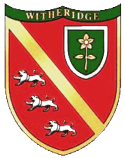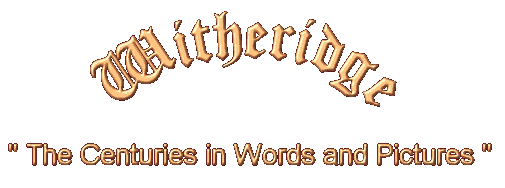

|
Mrs Bristow's grandmother (Anne Way) on her mother's side, went to work at the age of eight as a scullery maid at the Mitre, Witheridge, for "the Benson's, parents of Rev. J. P. Benson. Mrs Bristow (GB) says the Mitre was so called because it was built in the shape of a bishop's mitre. (GB)'s mother was a dressmaker and seamstress and learnt her trade at the age of nine at Mrs Mansfield's (wife of H.J. Mansfield, Grocer and Draper - see directories for 1893 etc.) She "went away for three years to improve as a tailoress" and continued her trade after her marriage to William Ford. She used to take her Singer sewing machine out on foot to places like Bradford and Shillaton Cottage (near Westway) to do work, and (GB) remembers as a child helping her to carry the machine and how heavy it was. (GB)'s mother made the page boy outfits and the wedding dress for the daughter of Dr. Brown (of the Firs, Witheridge - see directory for 1914) - and when the dress was laid out on the big kitchen table the children daren't move or speak, but got on with their chalk and slates or their rag-mat making. If they were a nuisance it was "boots off, wash and up over" to bed. In the cottage (27 West Street, formerly known as Venn Bridge Hill) there were three bedrooms, two landings, a kitchen and a parlour and Mr and Mrs W. Ford raised 16 children there; some slept on the landings. So crowded were they that (GB)'s brother Fred was sent to school at the age of 2 in a plaid dress to make room." (GB) recalls 7 of her brothers and sisters at school at the same time. Discipline at home was strict, Will Ford sat at table with a cane by him at meal times, and "if you didn't sit up straight you caught it" or "you might get the knife across your fingers." (GB) recalls even at the age of 21 she was refused permission by her father to go to a dance because "your place is home." Will Ford was tee-total when he married, but he found working for Rogers and Hutchings, that building work took him to farms where cider was popular, and he took to drink. There were times when, out of his weeks wages of twelve shillings, ten shillings went on drink and only two shillings was handed over to his wife to keep the family for the following week. Mrs Fords sewing was often the family's mainstay. Will Ford would "drink half a bottle of whiskey clean when he was drunk." One of the sons died on army service in India during the 1914-18 war, and a gratuity of £30 was paid; on receipt of it Will Ford didn't work for a fortnight and was drunk by 8.00am each morning. (GB) recalls that, whenever her father was in the pub in the evening, she and her mother had to wait up for him so that they were ready to unlace his boots for him when he came home; if she fumbled at the laces, GB would get hit beside the head; if she continued to fumble she was sometimes turned out and locked out for the night. Will Ford and Ern Hutchings used to go out rabbiting on Saturdays and, again (GB) and her mother always had to wait up. On one occasion it had got dark when they heard gunshots in the Square. They hurried out and found two men trying to shoot the church clock. In the cottage the night was the time for clothes drying from the days wash, but all had to be cleared by 5.00am so the day's work could start, the breakfast, the packed food for the boys, the bottles of tea stuffed into old socks warmed in the oven. Then the new day's washing in the tub and on the stove; off came the wash at 12 so that Will's dinner could be cooked, then more washing until the boys came home at 5. (GB) recalls that on the day of her marriage to Jack Bristow, she did her morning work at home, then went to Crediton with him to the Registry Office for the ceremony, came home and went on helping to look after her thirteen younger brothers and sisters. It was only later that she and Jack could set up house at the Gunhole, and even then she continued to do the washing for the thirteen and for Jack's parents. Children's Work: (GB) brother Jim went at 13 to work for Mr G. Selley, butcher of South Street. Mrs Selley bought him "a nice little shirt and a new pair of boots" which he had to leave behind when he left work each evening to go home in case the other children had them. Jim had exemption from school at 13 to go work at Cannington, because of shortage of labour during the 1914-18 war. (GB) remembers Jim delivering meat with Mr G Selley's daughter Constance to Beech House, Morchard Bishop. (GB) used to have to pick up sticks each night, which would be put into the oven to dry and be ready for lighting the morning's fire. Both (MB) and (GB) recall picking up acorns, the former for their own pig, the latter for sale often at Bything (Betham) for their pigs. (GB) would sometimes bring home a penny halfpenny. (MB) was not allowed to go further than "Coombe Tree." (MB) once picked enough blackberries to earn the price of a new umbrella. (GB) recalls how her sister (now Mrs Bourne) and Maria Clarke went to pick blackberries in West Yeo ground beside the main road; they had filled their milk cans when suddenly they were chased by a pig; they dropped their cans and ran, but when they looked back they saw that the lid had come off one of the cans and the pig had put its snout in and had got the can jammed on its snout. The girls were afraid the pig would die and ran to the road to stop a passer by who came and got the can off the pig. During the 1914-18 war the school children used to go down to Coombe to join pieces together to make quilts for soldiers in one of the barns. At the age of 15 in the Great War (GB) recalls being paid tuppence an hour for weeding corn by Mr. G. Selley. School: (GB) remembers Mr Andrews, National School Master, punishing (MB) by bumping her head on the desk and making her nose bleed. On another occasion (MB) was dared to do an April Fool so she told Nettie Gunn she was wanted by Mr Andrews in the school garden. (GB) recalls at a scripture exam an inspector asked the class what animal was referred to by the phrase "out of the strong came forth sweetness"; she put up her hand "Yes sir, the lion sir, I saw it on the treacle tin." Fires: (EB) remembers being taken up to see the Rogers fire (see conversation with Mrs Greenslade.) Band: The Witheridge Band always played around the village on Saturday evenings in their uniforms. (GB) and Mr B. reckoned the band finished about 1906. Club Walk: Always on Oak Apple Day, May 29th; the girls wore oak apples, those that didn't wear them got pinched by the boys. The Square was full of stalls, roundabouts and swing boats. April Fair: Cattle in the Square and stalls, people from Morchard used to make and sell fairings and gingerbread, etc. Names: Pullen's Row was originally Summerland Row, West Street was Venn Bridge Hill. London Work: Dr Llewellyn (see Directory for 1870) took a liking to (GB)'s mother when she was a girl of 11 and took her to London to improve her sewing (see first note of this discussion.) Neither (MB) or (GB) recalls any men or boys from Witheridge going to work in the South Wales coalmines after the Great War. Fight: (GB) recalls how Elias Bryant and Will Ford gave each other black eyes at a flower show. Electricity: A Mr Burke lived in the 1930's in Cypress House and installed a generator there. The first house in Witheridge to be wired for electricity was Cannington. There was some suspicion about electricity among some; (GB) worked for Mr. Burke and he gave her an electric fire, but (GB)'s husband said "you'll not use that, you'll be killed." When Ebrington's Row was cleared in 1969 to make way for the entrance to Appletree Close, not all the houses had electricity. Pullen's Row was not connected until the 1960's and Ford's Folly not until 1972. Previous Last Edited 03/07/2006 Copyright © 2000-2006 Witheridge Unless otherwise indicated on the page in question, the photographic images reproduced on this site belong to the Witheridge Archives, and, as such may not be reproduced for commercial purposes without written permission. However, you are welcome to use any of the photographs belonging to the archive for personal and/or non-commercial use. Any material shown as not being owned by the archive may not be reproduced in any form without first receiving written permission from the owner of the material in question. |

